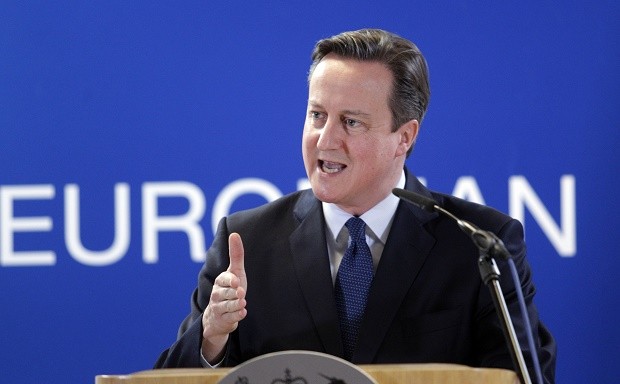British PM warns on Brexit risks as sterling plunges

British Prime Minister David Cameron speaks during a media conference at an EU summit in Brussels on Friday, Dec. 18, 2015. AP FILE
LONDON, United Kingdom — Prime Minister David Cameron warned Monday that a vote to leave the EU would risk Britain’s economic and national security, as uncertainty over the outcome of the June referendum sent the pound plunging.
In a speech to the House of Commons, the Conservative leader launched a barely-veiled attack on London Mayor Boris Johnson, his long-term rival who has come out for Britain exiting the EU — a Brexit — accusing him of taking the position for political gain.
READ: Pound takes hit in Asia on ‘Brexit’ fears | ‘Brexit,’ migrants endanger EU — European chief
Johnson challenged the prime minister to demonstrate how the deal reached in Brussels last week would return sovereignty “over any field of law-making” to the British parliament.
Cameron said the deal would give the UK government greater powers over benefits, migration and an opt-out from an “ever-closer union.”
Article continues after this advertisementHe told MPs to be clear that a vote to leave would be a “final decision,” not a way to pitch for better membership terms.
Article continues after this advertisement“Having a second renegotiation followed by a second referendum is not on the ballot paper,” he said.
As sterling fell to a near seven-year low against the dollar on the currency markets, Cameron told lawmakers that it was time to “properly face up to the economic consequences of a choice to leave”.
The pound had strengthened slightly on Friday following Cameron’s deal with fellow European leaders for enhanced membership within the Union.
But the currency fell on Monday following Johnson’s dramatic announcement on Sunday evening that he would back a vote to quit the EU.
Eurosceptics say Britain would still be able to trade with the European Union outside the bloc and regain control over laws and borders, but Cameron said that this would only be “an illusion of sovereignty”.
He also warned repeatedly that the threats of terrorism and Russian aggression in Ukraine meant remaining in the 28-nation club was more important than ever, saying: “This is no time to divide the West.”
Most analysts expect Britain to vote to stay in the EU on June 23, but opinion polls show the public is divided and the declaration of Johnson for the “Leave” camp has boosted its chances.
The pound plunged to $1.4058 in early afternoon trading Monday, its lowest level since March 2009, before recovering slightly.
Simon Smith, chief economist at FxPro, warned uncertainty ahead of the vote would weigh on the currency.
“For sterling, this won’t be a fun time,” he said.
‘No other agenda’
Cameron set out the details of the reforms secured at an EU summit in Brussels last week, which he argues give Britain “special status” and are enough reason to vote to stay in.
He is facing a major challenge in Johnson, a charismatic figure who manages to reach across the political divide and is tipped as a future prime minister.
Johnson’s announcement Sunday that he would back a Brexit boosted the “Leave” campaign, which until then had been marred by in-fighting and a lack of leadership.
Six ministers who attend cabinet have already declared themselves in favor of the “Leave” campaign and reports suggest around a third of Cameron’s 330 lawmakers could back a Brexit.
The premier emphasized that he has promised not to contest the next election and had “no other agenda than what’s best for our country”, a reference to speculation that Johnson is backing Brexit as a move on the Tory leadership.
And he condemned the idea that a “Leave” vote could simply be a tactic to win further EU reforms, an idea indirectly referenced by Johnson, as “for the birds”.
No country has ever left the EU and the prospect of a Brexit is posing a major headache for the bloc, already grappling with its biggest migration crisis since World War II.
Britain first joined the then European Economic Community (EEC) in 1973, and in a referendum two years later the public backed membership by just over 67 percent.
But the country has had a strained relationship with Brussels, opting out of key projects including the euro and the Schengen passport-free zone.